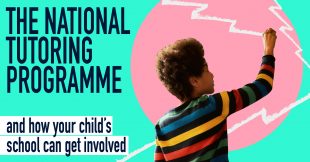
The National Tutoring Programme (NTP) will help boost the learning of those pupils most affected by the impact of missed time in school during the pandemic.
The programme gives pupils access to one-to-one, online or small group teaching with specialist tutors.
Backed by more than £400million since it was introduced in June last year, it will help us mitigate and better understand the varied effects of lockdowns on young people’s education.
How does it work?
The National Tutoring Programme provides schools with high-quality, subsidised tuition through carefully selected organisations that work with highly-trained tutors. These tutors – who have all been subject to robust high-quality training and safeguarding checks – are able to provide additional capacity to schools to support disadvantaged pupils who have been impacted by disruption to their education.
Schools can access the subsidised tuition through this website. Schools can search for providers in their region from an approved list and make an enquiry directly with their chosen provider.
The NTP can only be accessed by schools for their pupils. The evidence shows this is the best way to make sure tutoring is effective, targeted and linked to what pupils are learning in school.
Why is the NTP needed?
There is a substantial attainment gap between pupils from disadvantaged backgrounds and their classmates – and this is likely to have grown significantly since school closures. There is extensive evidence showing the impact of tutoring to support pupils who have fallen behind.
However, access to tutoring is often limited to the schools and parents that can most afford it. It’s estimated that around 80% of disadvantaged pupils don’t have access to quality tuition. The NTP aims to help change that.
Which pupils will have access to the tutoring?
The NTP has been developed to provide additional, targeted support to those children and young people due to having lost time in education during the last year.
All state funded schools in England are able to access this additional resource to support disadvantaged pupils. Teachers and school leaders should use their professional judgement to determine which pupils are in most need of support.
We expect the majority of pupils receiving tutoring will be disadvantaged and therefore eligible for the Pupil Premium, but ultimately it will be for schools to decide where the support will be most effective.
Can pupils with special educational needs and disabilities get help from the NTP?
Yes. The NTP is open to all children and young people who need the most support catching up. Many of the organisations we are working with are able to support pupils with SEND and are able to support pupils in special school settings.
Which subjects will tutoring be available for?
The NTP provides tuition funding in six main areas:
- English
- Humanities
- Maths
- Modern foreign languages
- Science
- Primary (literacy, numeracy and science)
When will the tutoring be delivered?
Tuition is very flexible and can happen in-school, either online or face-to-face, or during the Easter holidays and May half-term. These arrangements will depend on individual circumstances such as the preference of the family and school, and tutor availability.
Tutoring sessions should happen at appropriate times for pupils, for example immediately after the school day. If tutoring is taking place during the holidays it should happen broadly in line with school hours.
How do I make sure my pupil’s school is getting involved?
For more information on tuition and any alternative additional support which may be available, please contact your child’s school.